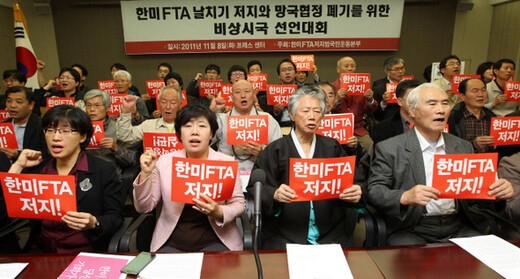hankyoreh
Links to other country sites 다른 나라 사이트 링크
[Editorial] Ruling government’s red-baiting offensive

There are several reasons for the Lee Myung-bak administration’s loss of public support, but one significant factor is the use of the law to suppress public opinion and the abuse of state forces to constrain opponents of the government. Its ready use of red-baiting tactics, branding opponents pro-North Korea or anti-American, has long been the object of ridicule among younger generations. It seems, however, that, far from gathering its senses, Lee administration is now only seeking ways to distance itself even further from public sentiment.
In a letter sent to Grand National Party (GNP) lawmakers yesterday, Senior Secretary to the President for Political Affairs Kim Hyo-jae branded questions raised by the public regarding the South Korea-U.S. Free Trade Agreement (KORUS FTA) “anti-American” and “pro-North Korea.” Kim even incorporated Kim Il-sung and Park Chung-hee into his absurd argument about the KORUS FTA. This was a transparent attempt to push past a difficult situation by choosing to paint opponents in political colors rather than make sincere efforts to persuade the public.
According to this logic, KORUS FTA supporters including Kim can have little to say if others brand them “puppets of the U.S.” Aside from the letter’s absurd insinuations, the fact that the president’s senior secretary for political affairs, whose job it is to play the honest role of a bridge between the National Assembly and Cheong Wa Dae, sent a letter to all GNP lawmakers, preaching to them and issuing them battlefield-style orders, is incomparably insolent.
Even more deplorable is prosecutors’ plan to detain and investigate all those that protest against the KORUS FTA and spread “false rumors” about it. One document calling itself a “perfect breakdown of 12 poison pills in the KORUS FTA,” which prosecutors have cited as an example of “scaremongering” material, explains problems with the agreement using easy metaphors (for example, it describes ratchet clauses as creating a situation where “the Korean team can only move forward and cannot move backwards in order to defend”). It begs the question of whether prosecutors have lost their senses when they say they will punish people just for distributing such a document.
Prosecutors were already humiliated after blogger Park Dae-sung, alias “Minerva,” whom they detained on charges of spreading false information, was found innocent at trial. The Constitutional Court has even ruled that Clause 1 of Article 47 of the basic law on telecommunications, which prosecutors cited as grounds for punishing Minerva, was unconstitutional. How bad must things be for the GNP, at a party policy meeting, to unanimously brand prosecutors’ plan as “an anachronistic idea” and demand that they cease investigations?
The behavior of Kim Hyo-jae and prosecutors is clearly the result of their faithful following of the will of President Lee Myung-bak. Lee has effectively responded to the demands for reform that have recently burst forth from one part of the GNP with actions that go exactly in the opposite direction. It appears that appeals to the president for communication, reform and basic policy changes, too, merely fall on deaf ears.
Please direct questions or comments to [englishhani@hani.co.kr]
Editorial・opinion
![[Editorial] Does Yoon think the Korean public is wrong? [Editorial] Does Yoon think the Korean public is wrong?](https://flexible.img.hani.co.kr/flexible/normal/500/300/imgdb/original/2024/0417/8517133419684774.jpg) [Editorial] Does Yoon think the Korean public is wrong?
[Editorial] Does Yoon think the Korean public is wrong?![[Editorial] As it bolsters its alliance with US, Japan must be accountable for past [Editorial] As it bolsters its alliance with US, Japan must be accountable for past](https://flexible.img.hani.co.kr/flexible/normal/500/300/imgdb/original/2024/0417/6817133413968321.jpg) [Editorial] As it bolsters its alliance with US, Japan must be accountable for past
[Editorial] As it bolsters its alliance with US, Japan must be accountable for past- [Guest essay] Amending the Constitution is Yoon’s key to leaving office in public’s good graces
- [Editorial] 10 years on, lessons of Sewol tragedy must never be forgotten
- [Column] A death blow to Korea’s prosecutor politics
- [Correspondent’s column] The US and the end of Japanese pacifism
- [Guest essay] How Korea turned its trainee doctors into monsters
- [Guest essay] As someone who helped forge Seoul-Moscow ties, their status today troubles me
- [Editorial] Koreans sent a loud and clear message to Yoon
- [Column] In Korea’s midterm elections, it’s time for accountability
Most viewed articles
- 1Samsung barricades office as unionized workers strike for better conditions
- 2[Column] The clock is ticking for Korea’s first lady
- 3[Editorial] When the choice is kids or career, Korea will never overcome birth rate woes
- 4Why Israel isn’t hitting Iran with immediate retaliation
- 5[News analysis] After elections, prosecutorial reform will likely make legislative agenda
- 6S. Korea, Japan reaffirm commitment to strengthening trilateral ties with US
- 7Japan officially says compensation of Korean forced laborers isn’t its responsibility
- 8[Editorial] As it bolsters its alliance with US, Japan must be accountable for past
- 9[Editorial] Does Yoon think the Korean public is wrong?
- 10[Guest essay] How Korea turned its trainee doctors into monsters